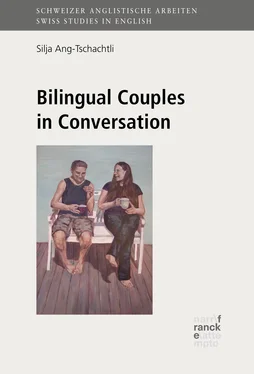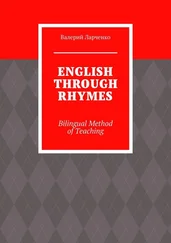Bilinguals may not just construct their identity differently in their two languages, they may also feel and interpret things differently, depending on which language they speak. Therefore, Wierzbicka suggests that being bilingual “means to live with two different sets of concepts, and through them, different ways of interpreting human relations” (2005: 15). She is of the opinion that different languages are not only linked to different manners of feeling and thinking, but that “they are linked with different attitudes, different ways of relating to people, different ways of expressing one’s feelings […]. They are linked with different ‘cultural scriptscultural script’, including ‘emotional scripts’” (2004: 98). The level of emotionality a language carries for a bilingual may thus have an effect on his or her language choice, both in general and in specific situations. This will be discussed in more detail in chapter 8, “‘In Swiss German, I lieb di , that’s strange’: Expressing emotions”.
5.2.5 Gendergender and family situationfamily situation
A number of researchers have proposed that multilingualism itself may be gendered, which could have consequences for the language choicelanguage choiceinfluence of gender on of bilingual couples. It is noteworthy that even the selection of a cross-cultural partner is often influenced by gender roles and cultural stereotypes. As Piller points out, this is particularly evident in romance travel: “men from industrialized nations go on ‘romance tours’ to choose an overseas bride, while women from underdeveloped nations migrate to join their overseas husbands and take up residency with them” (2007: 346). Further aspects that are potentially gendered are the choice of the place of residence and of the relationship language. Piller reports that, in her sample of 47 couples living in the home country of one partner, the native language of both genders was used with comparable frequency. However, since more female partners had migrated to their partner’s country (43 out of 47), a high number of females, namely 22, found themselves in a doubly disadvantaged position, having “given up their status as natives and their status as native speakers” (2000: section 4.3, para. 3). In contrast, only 3 out of 47 male partners in her sample were in a similarly disadvantaged position (see also section 3.3.3.1, “L2 learning and use”). In a different study of 13 German and English-speaking couples, Piller found that sometimes, “one partner may be stuck with all the deficient labels, ‘female’, ‘migrant’, and ‘non-native speaker”, while the other receives all the prestige labels, ‘male’, ‘native’, and ‘native speaker’” (1999: 119).
Moreover, a person’s gender may be of significance to his or her access to and view of multilingualismmultilingualism, as well as to the value that is attributed to his or her multilingualism. According to Piller and Pavlenko, there are “two ways in which gender structures multilingualism in [the] domains [of economic production and social reproduction]: gender structures access to language as symbolic capital, and ‘doing multilingualism’ may in itself be a gendered practice” (2007: 26). They postulate that “[l]anguage work, language learning, and bilingual childrearing have all become sites that are implicated in the reproduction of hegemonic gender ideologies” (2007: 27). Thus, access to languages is often limited for immigrant women, especially for members of a lower social class. Gender can also play a role with regard to the economic benefits of speaking a second language. This applies to English in Switzerland: The language carries a high economic value, yet apparently more so for men than for women. As the economist François Grin discovered, in Switzerland, men who are highly proficient in English have a significantly higher income than women who have a high level of proficiency in the language (2001: 73).
Finally, whether or not a couple has childrenlanguage choicewith children will also inevitably influence their language choice(s) to some extent. It is conceivable that each parent’s language use with his or her children might be influenced by his or her gender, too, since language socialisation and transmission tended to be allocated to the female partner in the past (Schüpbach 2009: 20). Consequently, the non-community languagenon-community language may be more likely to be transmitted if it is the mother’s native tongue than the father’s. Moreover, while many couples may not take conscious decisions relating to their joint language at the beginning of their relationship, this usually changes once they have a family. At this point, careful language planning often takes place (see Piller 2002a: ch 9). Consequently, the family situation may affect their language choice(s) in general as well as their language mixing behaviour (see section 7.6, “The couples’ views on raising bilingual children”).
5.3 The partners’ language uselanguage choicewith each other with each other
As the overview of previous work has highlighted, research on the language choices of bilingual couples indicates that, depending on the personal background of each partner and on their relationship history, there are a multitude of factors that interact in determining their relationship language. Consequently, my first aim is to see which factors are of prime importance for the ten bilingual couples within this specific setting, whether the prominence of these factors has shifted over the course of their relationship, and whether this has led to any changes in their language use. To this end, the couples were asked which language they usually speak to each other, as well as if, and why, they ever mix languages. Nine of the couples responded that they mostly use English, while only one couple (Deborah/Joshua) uses both languages regularly. The inclination towards English that most couples demonstrate can partly be explained by the selection of the participants for this study: The language of the interviews was English, and I specifically looked for couples whose relationship language was English or a mixture of both languages, as I wanted to examine proficient L2 speakers of English (though it may be noteworthy that I did not happen to come across any couples who spoke mostly (Swiss) German to each other in my search for participants). Nevertheless, it is somewhat surprising just how little German most of the couples claimed to speak to each other, considering that their place of residence is Switzerland, and that most of the native English speakers know at least some (Swiss) German; a number of them even speak the language fluently. This high propensity to use the non-community languagenon-community language can probably be attributed to the fact that the mother tongue of one of the partners is English. The non-community language does not seem to be an unusual choice for couples consisting of speakers of (Swiss) German and of English (see Piller 2002a; Gonçalves 2013), yet it appears to be used far less commonly when other nationalities or mother tongues are involved.22 Even so, the reasons for the couples’ language choice may be manifold, and I will attempt to shed light on them by discussing their answers while bearing in mind previous research on the subject.
According to previous studies, the most important factors in the language choice of bilingual couples are both partners’ proficiencyproficiency in their L2, their country of residence, their habits, as well as their attitudes towards both languages. Although the interplay between these factors can be quite complex, there are a number of similarities between the couples in this study with regard to these factors. When they met, all English-speaking partners, apart from Joshua E, were residing in an English-speaking country,23 mostly their country of origin, and they had had little or no prior exposure to German. One of them, Richard E, had studied the language briefly at school, and David Ehad enrolled in a German course at university (but failed the course, see example 5.1 below), while the others had no knowledge of German. In contrast, all of the Swiss participants had studied English formally for several years, primarily at a grammar school: 7 of them had a Swiss Academic Baccalaureate (“Matura”) in English, and 2 were in the process of obtaining their Academic Baccalaureate when they met. The only Swiss participant without an Academic Baccalaureate, Sarah SG, was taught English for three years in secondary school, and later attended a language school in Australia for a few months. Moreover, 6 of the Swiss interviewees were pursuing a university degree in English literature and linguistics when they met their partners. In addition to their extensive formal educationlanguage acquisitionformal in English, all Swiss partners had also been exposed to English in a natural environmentlanguage acquisitionnatural. In fact, all of the Swiss participants except for Deborah SGand Sophia SGwere spending an exchange year in an English-speaking country at the time of their first meeting (Sophia did, however, live in America for a year when she was 11). Considering the fact that the Swiss participants — possibly with the exception of Deborah SG— were much more fluent in their L2 than their partners when they met, it is hardly surprising that they started out using English as their couple language. The interviewees’ reports confirm that their language skills had the greatest influence on their language choice at the beginning of their relationship.
Читать дальше












